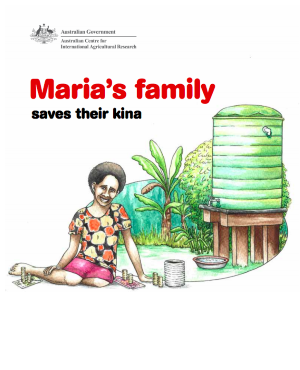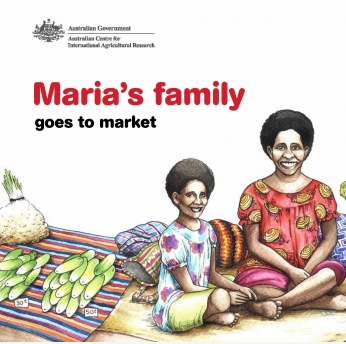Maria's Family Books
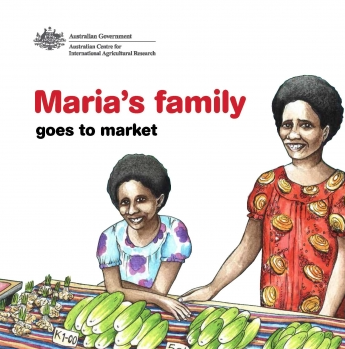
|  | 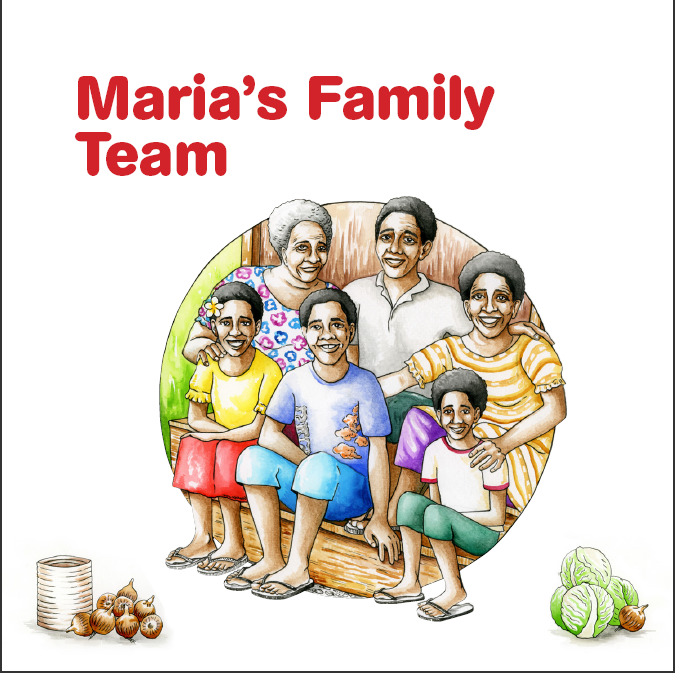 | ||
Maria’s family saves their kina Femili bilong Maria sevim moni | Femili bilong Maria go long maket | Femili bilong Maria go long maket |
About the books
The 'Maria's family' children's books were created as a resource for PNG families, teachers and community educators with the aim of teaching key agricultural messages to farming families; help parents engage in reading activities with their children; and develop literacy skills of both parents and their children.
The books were created and designed in collaboration with local women leaders and farmers in two project sites in PNG (see below for further details). We thank the local collaborators for their contributions that make these books truly ‘place-based’ and ‘place-informed’. There are four illustrated dual language (Tok Pisin and English) children’s books within the ‘Maria’s family’ books series.
There is also a 'Big Book' version (large versions of the series) that was designed for use in school classrooms, for adult literacy classes and for use by community and church groups.
Click to read about the Maria books as an adult learning tool
Click to read about how the Maria books were used in schools
Other Resources
Click to view WAYS TO USE MARIA’S FAMILY BOOKS FOR TEACHERS
Click to view WAYS TO USE MARIA’S FAMILY BOOKS AT HOME
Posters
Click below to download the posters for parents to help their children learn about farming life: Helping your child learn through talking (Helpim Pikinini Blo Yu Long Toktok) and Things you can talk to your child about
| Helping your child learn through talking (English) | Helpim Pikinini Blo Yu Long Toktok (Tok Pisen) | Things you can talk to your child about |
 |  | 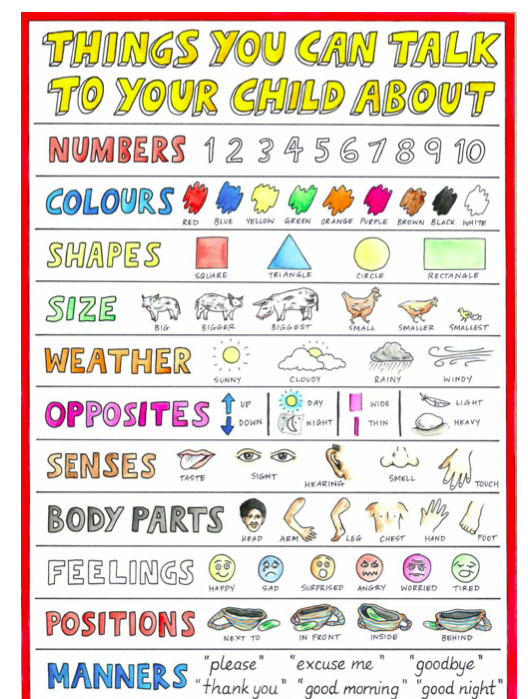 |
Go to the Teachers Resources page to access family teams posters: Budgeting and saving together; Earning and saving together; Selling at the market; and the Looking after your chickens poster and brochure.
Background
The idea to develop these resources came from initial project research that found many farmers were making simple mistakes in marketing their produce, and almost all were not budgeting for their agricultural and families’ futures. Research also revealed the literacy rate of project participants was very low (a key deterrent to attending traditional agricultural training). The life goals of many local women farmers included becoming literate and helping their children complete their education, so it was these issues that led to the development of the Maria books.
The text was developed based on the research findings and edited for best practice in early childhood reading instruction. Draft illustrations (based on images, local stories and real life examples) and draft versions were piloted in the Western Highlands and East New Britain. The trials involved community workshops with mothers, fathers and children and additional trials in local schools. Through collaborative consultation, this process enabled feedback on text and illustrations with the goal of creating useful resources with local context and relevance.
The books were published and printed by ACIAR and were launched in Goroka in 2014 by the Australian Foreign Minister, the Hon. Julie Bishop – click here to read more about their launch.
Sites
Project sites that contributed significantly to the development of the books were East New Britain and the Western Highlands as follows:
East New Britain
Leaders: Kiteni Kurika and Elizabeth Medline Ling (National Agricultural Research Institute) and Kwadile Tuam (Department of Primary Industry).
Tinganagalip community members and their leaders: Caroline Misiel, Marshall Marum and December Misiel.
Vunapalading 1 community members and their leaders, Judith Robin Bobo, Steven Liai, Roslyn Nguangua and Pastor Michael Ningi.
Western Highlands
Leader: Fredah Wantum
Kwinkya community members and their leader, Susan Trapu
Kumbareta community members and their leaders, Kay Simon and Lessie Pyare
Distribution and developments
Throughout 2015 the Maria books were distributed to all families who have children attending primary school in the focus villages in which they were developed.
The books are currently supported by a professional development program for school teachers and are part of the community training program for Village Community Educators. Community educators are also being trained on the use of the Big Book versions for community activities such as Church Fellowship groups.
Support, evaluation and follow-up in relation to the development and dissemination of the ‘Maria’s family’ book series is ongoing.

This work is licensed under a Creative Commons Attribution-NonCommercial-ShareAlike 4.0 International License.


